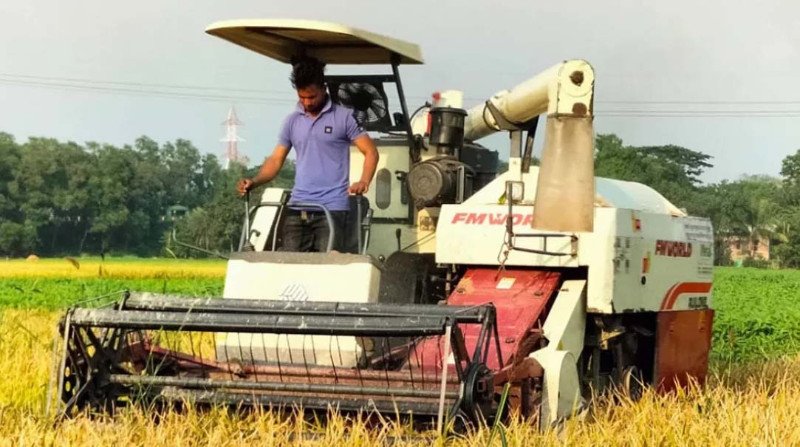Sylhet doubles up on mechanized harvesting
Published: 22 December 2024, 4:20:28

Farms in Bangladesh’s Sylhet division have significantly outnumbered those in all other divisions in adopting mechanization.
Preliminary findings of recent research reveal that 44% of Sylhet’s farms used modern machines to harvest the Boro crop in 2023, compared to a national average of only 20% for mechanized harvesting.
Farmers in Sylhet division who cultivated rain-fed Aman rice the same year also used harvesters in 25% of cases, which is 10 percentage points higher than the national average of 15%.
The massive crop losses caused by flash floods, widespread corruption in the construction and maintenance of protective embankments in greater Sylhet’s Haor belt, and special incentives provided to farmers in the northeastern wetland ecosystem to purchase farm machinery at subsidized rates may be contributing factors.
The preliminary findings of the research, conducted by the Washington-based global food policy think tank, the International Food Policy Research Institute (IFPRI), suggest regional imbalances in the distribution of machinery.
Survey respondents informed IFPRI that some high-cropping-intensity regions, such as Rajshahi and Rangpur, have been deprioritized, while Sylhet division (Haor areas) received the majority of the machines. They highlighted farmers’ reliance on manual labor due to unmet demand for harvesters in rice-rich districts like Rangpur and Dinajpur.
Conversely, there is an acute shortage of farmhands in greater Sylhet, where large-scale farmers depend on seasonal laborers from other labor-surplus districts.
Absentee landowners holding Sylhet back
Are absentee landowners preventing Sylhet from achieving the level of farm productivity seen in other regions of the country?
Official statistics reveal that over a quarter of all cultivable land in Sylhet Division remains fallow, and half of the remaining land supports only a single crop. This makes the greater Sylhet region less productive.
While the rest of Bangladesh has reached a cropping intensity of 200%, Sylhet Division lags behind at just 160%.
Cropping intensity refers to the number of times crops are planted annually in a given agricultural area. It is the ratio of the effective crop area harvested to the physical area.
According to officials from the Ministry of Agriculture (MoA), the primary reason Sylhet’s farming potential remains underutilized is the prevalence of absentee landowners.
A presentation by Kazi Mojibur Rahman, Deputy Director of the Department of Agriculture Extension’s Sylhet Division, highlights that 196,399 hectares out of a total 763,254 hectares of cultivable land remain fallow in the four districts of Sylhet Division: Habiganj, Moulvibazar, Sunamganj, and Sylhet.
Official data also indicates that as many as 54% of farmers in greater Sylhet are either landless or marginal landholders. Meanwhile, many landowners reside abroad, leaving their farmland either unused or underutilized.
Beyond absentee landowners, Sylhet’s agricultural sector faces additional challenges, including insufficient irrigation facilities, high iron concentrations in water, flash floods, the onrush of hilly water and intense rainfall, weak embankment infrastructure, and delays in introducing short-duration crop varieties in the Haor zone.
IFPRI workshop presents findings on agricultural mechanization
IFPRI, with support from the Bill & Melinda Gates Foundation, recently convened a knowledge-sharing workshop on “Agricultural Mechanization in Bangladesh” at a city hotel.
The workshop presented IFPRI’s preliminary research findings and facilitated dialogue among policymakers, researchers, practitioners, bankers, and industry experts to advance agricultural mechanization efforts.
Dr Akhter Ahmed, Country Representative of IFPRI-Bangladesh, emphasized the urgent need for targeted and sustainable agricultural mechanization in his remarks. “Rising rural wages and evolving labor dynamics in Bangladesh demand innovative mechanization strategies that not only enhance productivity but also support farmers’ livelihoods.”
Dr Md Mahmudur Rahman, Additional Secretary (PPC Wing), Ministry of Agriculture, highlighted the vital role of evidence-based research in shaping future agricultural mechanization policies in Bangladesh. “Subsidies remain both a necessity and a dilemma; we must ensure they are impactful and sustainable, with an emphasis on empowering local industries and reducing reliance on imports,” he stated.
IFPRI Research Fellow Dr Mehrab Bakhtiar and Associate Research Fellow Dr Moogdho Mahzab presented IFPRI’s ongoing policy research on farm mechanization in Bangladesh. They focused on aligning machine allocation with regional agro-ecological needs, addressing governance challenges, and analyzing market dynamics. The research revealed significant regional disparities in machine distribution, with some high-production areas being overlooked.
Additional issues included inefficiencies in subsidy targeting and notable gaps in training and after-sales support. The findings emphasized the importance of evidence-based allocation decisions, improved demand-supply coordination, and stronger support for local industries to enhance sustainability. The discussion underscored the need to address financing constraints, promote equitable access, and ensure quality standards to drive impactful mechanization policies.





